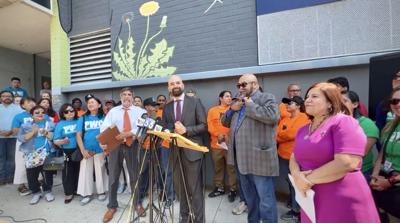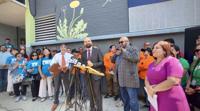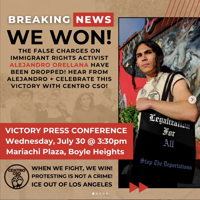
Local civil and worker rights groups, community members and day laborers gathered on Monday morning at the American Civil Liberties Union (ACLU) office in downtown Los Angeles. Photo by Brenda Verano
Local civil and worker rights groups, community members and day laborers gathered on Monday morning at the American Civil Liberties Union (ACLU) office in downtown Los Angeles to commend a federal appeals court's ruling in favor of the undocumented and immigrant community.
The ruling upholds a lower court's temporary restraining order (TRO) blocking federal agencies, including the Department of Homeland Security (DHS) and U.S. Immigration and Customs Enforcement (ICE), from conducting indiscriminate immigration stops and arrests in Los Angeles and other Southern California regions.
The court ruling leaves in place the TRO that bars immigration agents from stopping individuals based on racial profiling or without reasonable suspicion.
The ruling announced on Friday afternoon came after the federal government’s attempt to pause and overturn the TRO issued July 12 by Judge Maame E. Frimpong, arguing it hindered the agency's enforcement of immigration law.
This was in direct response to a lawsuit filed by residents, workers, and advocacy groups such as the Los Angeles Worker Center Network (LAWCN), United Farm Workers (UFW), the Coalition for Humane Immigrant Rights (CHIRLA) and Immigrant Defenders Law Center against DHS’s alleged abduction and disappearing of community members using unlawful stop and arrest practices and confining individuals at a federal building in illegal conditions while denying them access to attorneys.
“This is a landmark victory, not just for those in the courtroom, but for every farm worker, garment worker, and day laborer who's been profiled, detained, harassed, or simply detained just for existing,” said Armando Gudino, executive director of the LAWCN. “Let me be clear: ICE and law enforcement are not above the law; the Fourth Amendment doesn't stop at the gates of a car wash.”
Moving forward, the federal government will no longer be able to detain and arrest people solely based on apparent race or ethnicity; speaking Spanish or English with an accent; presence in a particular location like a bus stop, car wash, or agricultural site; or the type of work a person does.
“It is bigotry, pure and simple,” Chandra Bhatnagar, executive director of the ACLU Foundation of Southern California, said when referring to the racial profiling behind many of the ICE raids that erupted on June 6.
One of the people present at Monday’s press conference was Pedro, a resident of Pasadena and a plaintiff in the lawsuit against DHS, who was arrested at a bus stop as he was waiting to be picked up for a job on June 18, 2025.
“I came to this country looking for dignity and safety for a chance to provide for my family with honesty and effort, but what happened to me in Pasadena in June has changed my life forever. I was simply standing at a bus stop waiting to get to work like I do every day. Then, without warning, several unmarked cars showed up and men jumped out, grabbed me and my coworkers, and took us away like we were criminals, like we were nothing,” he said in Spanish.
Pedro, who is diabetic, was then taken to the basement of the Los Angeles downtown federal building, referred to as "B-18,” where he said he shared a room with 52 other people and had no bathroom or hygiene. “Just filth and fear,” he said. “What they gave us was inhumane, nothing a sick person should ever have to eat. My sugar levels were out of control and I developed an eye infection while detained, but no medical attention ever came.”
Pedro was detained for three weeks. “I was granted bond, but the trauma hasn't left me. I don't leave my house unless absolutely necessary,” he said.
Mohammad Tajsar, staff attorney with the ACLU Foundation of Southern California, said that when it came to the ruling, the judges questioned the federal government’s ability to defend their own record of racial profiling and referenced one of the texts on the ruling.
“If, as Defendants suggest, they are not conducting stops that lack reasonable suspicion, they can hardly claim to be irreparably harmed by an injunction aimed at preventing a subset of stops not supported by reasonable suspicion,” the judges wrote.
Tajsar explained that the judges questioned the federal government’s claims of not breaking the law. “On one hand, the government says it's not engaging in racial profiling; on the other hand, it seeks to fight an order that prevents it from engaging in racial profiling. We know the reason for this hypocrisy,” he said.
Tajsar also reminded the community that this is not just a win for the immigrant and undocumented community but also for those who have legal status in this country or who were born in the U.S.
“The federal government is disregarding the law; they're snatching up people regardless of status. It doesn't matter if you have status or you don't have status; they will come after you. We have many stories of individuals, both without status and with status, that have been subjected to these raids,” he said. “For everybody watching this today, you don't have the luxury of ignoring this case.”
Pedro, who continues to recuperate from the time in detention, agrees. “This is not just about me. This is happening to many of us. Our lives are sacred. We deserve respect,” he said. “I want justice for me and for every other person whose humanity has been denied.”
Angelica Salas, executive director of CHIRLA and Tajsar, said local organizations would continue to monitor the federal government's action and make sure they do not violate the appeals court's ruling and the temporary restraining order.
“The federal government is now bound by a judicial order from a United States federal judge,” Tajsar said. “It is now our job as lawyers and as counsel for the plaintiffs to investigate any incidents in which we suspect that the injunction is being violated and to bring that to the attention of both the federal government and, ultimately, a judge. “
Salas also reinforced the organization's commitment to protect immigrants: “We will continue to fight through the end of this case and we will continue to mobilize in the courts, in the streets and in the halls of government to remind this nation that as immigrants, we do belong here.”
The case is ongoing, with a hearing scheduled for September 24, 2025.










(0) comments
Welcome to the discussion.
Log In
Keep it Clean. Please avoid obscene, vulgar, lewd, racist or sexually-oriented language.
PLEASE TURN OFF YOUR CAPS LOCK.
Don't Threaten. Threats of harming another person will not be tolerated.
Be Truthful. Don't knowingly lie about anyone or anything.
Be Nice. No racism, sexism or any sort of -ism that is degrading to another person.
Be Proactive. Use the 'Report' link on each comment to let us know of abusive posts.
Share with Us. We'd love to hear eyewitness accounts, the history behind an article.